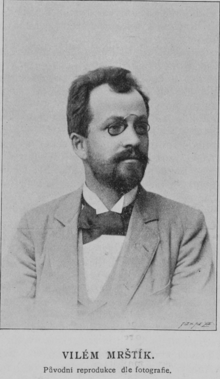Vilém Mrštík
Vilém Mrštík (born May 14, 1863 in Ingrowitz , † March 2, 1912 in Diváky ) was a Czech writer, dramaturge, translator and literary critic.
Life
Vilém Mrštík was one of four children of a shoemaker and a seamstress. His brothers Norbert Mrštík (translator, columnist) and Alois Mrštík were also active in the literary field. In 1869 the family moved to Ostrovačice near Brno. Vilém Mrštík later set the events in the fairy tale Pohádka máje in this area .
In 1874 the family moved to Brno and Vilém Mrštík attended the grammar school there. However, he finished school at the grammar school on the Lesser Town in Prague. He began to study law, but gave up after a year and devoted himself to literature.
In 1892 the family moved again, this time to Diwak . Vilém Mrštík and his brother founded a library there, which was later visited by Moravian and Czech friends and artists such as Joža Úprka , Josef Merhaut , František Pečinka , Karel Elgart Sokol , Václav Hladík , Leoš Janáček , Alois Kalvoda , Jaroslav Kvapil . Vilém Mrštík was a member of the literary group Česká moderna .
In 1886 Mrštík visited Russia . After his return he devoted himself to writing, preserving cultural monuments and protecting them from destruction. Because of his poor health, Mrštík ended his life by suicide.
Works
Vilém Mrštík was an admirer of French naturalism , especially of Émile Zola and of Russian realism Fyodor Mikhailovich Dostoyevsky and Lev Nikolayevich Tolstoy . He dealt with both literary directions in his reviews. He wrote for newspapers and magazines such as Rozhledy, Světozor, Ruch, Lumír , Česká Thálie, Zlatá Praha, Hlas národa, Literární listy , Národní listy , Pozor, Česká Revue and Moravskoslezská Revue, some of which he also edited with his brother. Some of the books were also written with his brother.
Its first publication was the lyrically composed Almanac Zora in 1883 . He wrote the most important works in the early 1890s.
Novels
- Santa Lucia. 1893. Fate of a poor Moravian student who comes to Prague full of ideals but dies betrayed, helpless, utterly impoverished and without ideals. This work has autobiographical traits.
- Pohádka máje. 1897. The story of a young student love in the great outdoors. Nature changes both characters, an epic on the healthy rural life in Moravia .
- Stíny.
- Obrázky.
- Zumři. Unfinished, finished by Karel Elgart Sokol after the death of Vilém Mrštík .
Travelogues
- Dojmy z cest po Šumavě , Krkonoších .
stories
- Kniha cest.
- with Alois Mrštík: Bavlnkova žena.
Literary criticism
- Moje sny.
Poetry
- Zora. 1883
theatre
- Maryša. Realistic drama from a Slavic village. The young girl Marisa is married to the widower Vavra for financial reasons. The marriage, Vavra brings three children with her, goes through numerous tensions and ends tragically. The drama illustrates the financial differences in the villages and the unequal position of women and men.
- Paní Urbanová. Drama about marital infidelity.
- Anežka.
Translations
Vilém Mrštík translated mainly from French and Russian.
literature
- Vladimír Justl : Bratři Mrštíkové. Prague 1963.
Web links
- Literature by and about Vilém Mrštík in the catalog of the German National Library
- Literature and other media by and about Vilém Mrštík in the catalog of the National Library of the Czech Republic
- R. Havel: Vilém Mrštík. In: Austrian Biographical Lexicon 1815–1950 (ÖBL). Volume 6, Verlag der Österreichischen Akademie der Wissenschaften, Vienna 1975, ISBN 3-7001-0128-7 , p. 400.
| personal data | |
|---|---|
| SURNAME | Mrštík, Vilém |
| ALTERNATIVE NAMES | Mrstik, Vilem |
| BRIEF DESCRIPTION | Czech writer, dramaturge, translator and literary critic |
| DATE OF BIRTH | May 14, 1863 |
| PLACE OF BIRTH | Jimramov |
| DATE OF DEATH | March 2, 1912 |
| Place of death | Brno |
